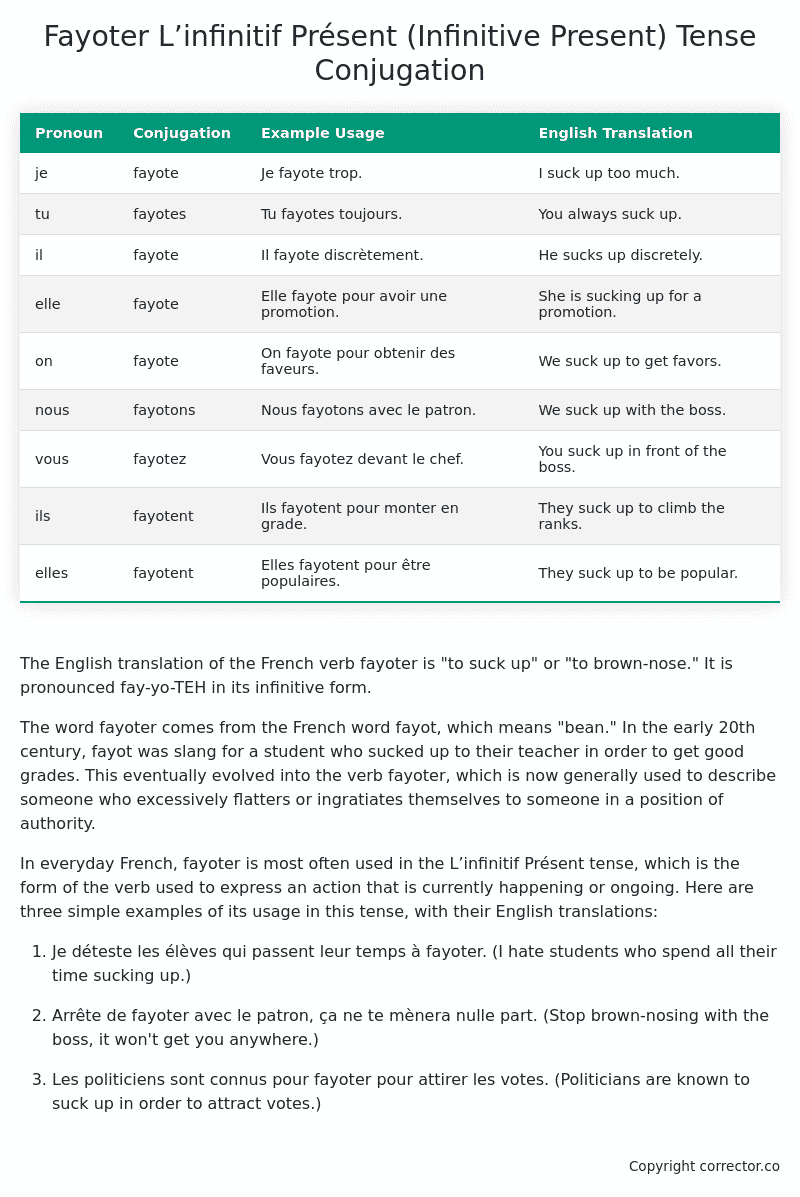L’infinitif Présent (Infinitive Present) Tense Conjugation of the French Verb fayoter
Introduction to the verb fayoter
The English translation of the French verb fayoter is “to suck up” or “to brown-nose.” It is pronounced fay-yo-TEH in its infinitive form.
The word fayoter comes from the French word fayot, which means “bean.” In the early 20th century, fayot was slang for a student who sucked up to their teacher in order to get good grades. This eventually evolved into the verb fayoter, which is now generally used to describe someone who excessively flatters or ingratiates themselves to someone in a position of authority.
In everyday French, fayoter is most often used in the L’infinitif Présent tense, which is the form of the verb used to express an action that is currently happening or ongoing. Here are three simple examples of its usage in this tense, with their English translations:
-
Je déteste les élèves qui passent leur temps à fayoter. (I hate students who spend all their time sucking up.)
-
Arrête de fayoter avec le patron, ça ne te mènera nulle part. (Stop brown-nosing with the boss, it won’t get you anywhere.)
-
Les politiciens sont connus pour fayoter pour attirer les votes. (Politicians are known to suck up in order to attract votes.)
Table of the L’infinitif Présent (Infinitive Present) Tense Conjugation of fayoter
| Pronoun | Conjugation | Example Usage | English Translation |
|---|---|---|---|
| je | fayote | Je fayote trop. | I suck up too much. |
| tu | fayotes | Tu fayotes toujours. | You always suck up. |
| il | fayote | Il fayote discrètement. | He sucks up discretely. |
| elle | fayote | Elle fayote pour avoir une promotion. | She is sucking up for a promotion. |
| on | fayote | On fayote pour obtenir des faveurs. | We suck up to get favors. |
| nous | fayotons | Nous fayotons avec le patron. | We suck up with the boss. |
| vous | fayotez | Vous fayotez devant le chef. | You suck up in front of the boss. |
| ils | fayotent | Ils fayotent pour monter en grade. | They suck up to climb the ranks. |
| elles | fayotent | Elles fayotent pour être populaires. | They suck up to be popular. |
Other Conjugations for Fayoter.
Le Present (Present Tense) Conjugation of the French Verb fayoter
Imparfait (Imperfect) Tense Conjugation of the French Verb fayoter
Passé Simple (Simple Past) Tense Conjugation of the French Verb fayoter
Passé Composé (Present Perfect) Tense Conjugation of the French Verb fayoter
Futur Simple (Simple Future) Tense Conjugation of the French Verb fayoter
Futur Proche (Near Future) Tense Conjugation of the French Verb fayoter
Plus-que-parfait (Pluperfect) Tense Conjugation of the French Verb fayoter
Passé Antérieur (Past Anterior) Tense Conjugation of the French Verb fayoter
Futur Antérieur (Future Anterior) Tense Conjugation of the French Verb fayoter
Subjonctif Présent (Subjunctive Present) Tense Conjugation of the French Verb fayoter
Subjonctif Passé (Subjunctive Past) Tense Conjugation of the French Verb fayoter
Subjonctif Imparfait (Subjunctive Imperfect) Tense Conjugation of the French Verb fayoter
Subjonctif Plus-que-parfait (Subjunctive Pluperfect) Tense Conjugation of the French Verb fayoter
Conditionnel Présent (Conditional Present) Tense Conjugation of the French Verb fayoter
Conditionnel Passé (Conditional Past) Tense Conjugation of the French Verb fayoter
L’impératif Présent (Imperative Present) Tense Conjugation of the French Verb fayoter
L’infinitif Présent (Infinitive Present) Tense Conjugation of the French Verb fayoter (this article)
Struggling with French verbs or the language in general? Why not use our free French Grammar Checker – no registration required!
Get a FREE Download Study Sheet of this Conjugation 🔥
Simply right click the image below, click “save image” and get your free reference for the fayoter L’infinitif Présent tense conjugation!

Fayoter – About the French L’infinitif Présent (Infinitive Present) Tense
Forming the Infinitive Present
Common Everyday Usage Patterns
As a Verb’s Dictionary Form
After Modal Verbs
As an Imperative
In Infinitive Clauses
Interactions with Other Tenses
Present Tense
Future Tense
Conditional Tense
Passé Composé
Imperfect Tense
Subjunctive and Conditional Moods
Summary
Want More?
I hope you enjoyed this article on the verb fayoter. Still in a learning mood? Check out another TOTALLY random French verb conjugation!


